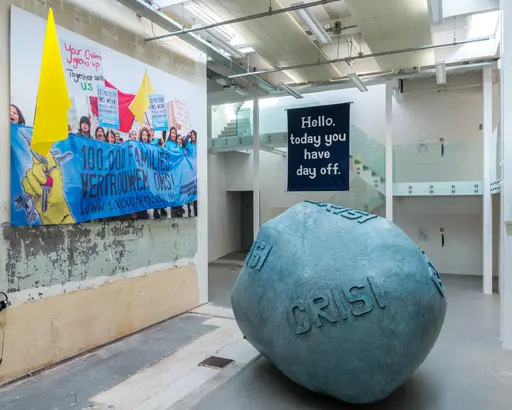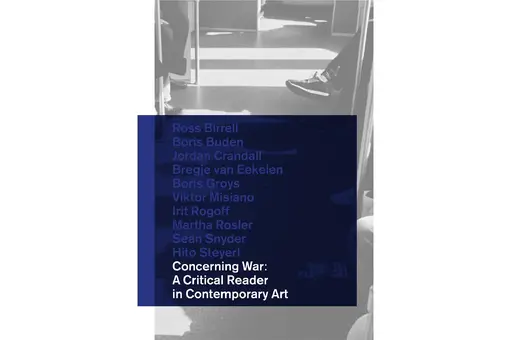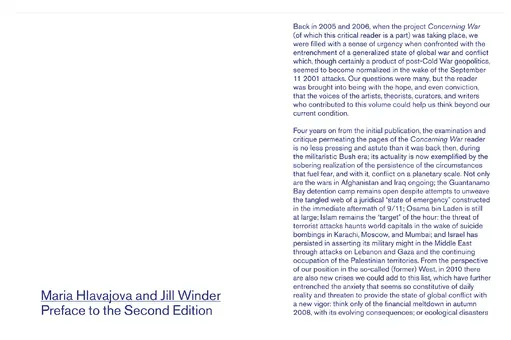Concerning War: A Critical Reader
Irit Rogoff is a writer, teacher, curator, and organizer working at the intersection of contemporary art, critical theory, and emergent political manifestations. She is a professor of Visual Cultures at Goldsmiths, University of London, London, where
Irit Rogoff is a writer, teacher, curator, and organizer working at the intersection of contemporary art, critical theory, and emergent political manifestations. She is a professor of Visual Cultures at Goldsmiths, University of London, London, where she heads the PhD in the Curatorial/Knowledge program and the MA in the Global Arts program. Her practice deals with geography, globalization, and contemporary participatory practices in the expanded field of art. Her current work focuses on new practices of knowledge production and their impacts on modes of research, under the title The Way We Work Now. As part of the collective freethought, Rogoff was one of the artistic directors of the Bergen Assembly, Bergen, 2016. In addition to contributing to numerous anthologies and catalogs, her publications include: Looking Away—Participating Singularities, Ontological Communities (2013); Visual Cultures as Seriousness (with Gavin Butt, 2013); Unbounded—Limits’ Possibilities (2012); and Terra Infirma: Geography’s Visual Culture (2000). She has also published in periodicals such as Art Journal, Open, e-flux journal, and Third Text. Rogoff lives and works in London.
Irit Rogoff is a writer, teacher, curator, and organizer working at the intersection of contemporary art, critical theory, and emergent political manifestations. She is a professor of Visual Cultures at Goldsmiths, University of London, London, where she heads the PhD in the Curatorial/Knowledge program and the MA in the Global Arts program. Her practice deals with geography, globalization, and contemporary participatory practices in the expanded field of art. Her current work focuses on new practices of knowledge production and their impacts on modes of research, under the title The Way We Work Now. As part of the collective freethought, Rogoff was one of the artistic directors of the Bergen Assembly, Bergen, 2016. In addition to contributing to numerous anthologies and catalogs, her publications include: Looking Away—Participating Singularities, Ontological Communities (2013); Visual Cultures as Seriousness (with Gavin Butt, 2013); Unbounded—Limits’ Possibilities (2012); and Terra Infirma: Geography’s Visual Culture (2000). She has also published in periodicals such as Art Journal, Open, e-flux journal, and Third Text. Rogoff lives and works in London.
The freethought collective came together in 2012 amid growing crises in the education sector, specifically the need for new knowledges to flow in and out of academia unhampered by strict protocols of evaluation, examination, and classroom outcomes. The “free” in freethought’s chosen name signals this need to detach knowledges from disciplines, institutional settings, and predictable outcomes, and to define new modes for circulation. In this way, freethought argues against differentiating academic and artistic practices, insisting instead that they together can expand and challenge through diverse materials and conceptual questions. Moving toward this, freethought is dedicated to public study and public research. To them, this means exploring thematics though numerous points and modes of collective research, including establishing what a subject might even be and which materials can illuminate it. Given that knowledge operates as a political force, collective knowledge based in experience can allow for an expanded field of what it means “to know” and what the stakes are in “knowing.”
freethought was first part of “Truth is Concrete,” steirischer herbst, Graz, 2012, exploring conceptions of “Education Crisis,” “Labour Crisis,” and “Creative Strikes”; they collaborated with BAK, Utrecht and Haus der Kulturen der Welt, Berlin to curate a strand of the final event of Former West, Berlin, 2013, on infrastructure; and co-curated the 2016 Bergen Assembly, Bergen focusing on how infrastructure is not a neutral mechanism of goods, services, and electronic supports, but the predominant condition of people’s lives, indoctrinating subjects in ways of thinking and acting—making “infrastructural beings.”
As BAK 2020 Fellows, freethought expands their infrastructure project to explore affective dimensions. They are calling this “Spectral Infrastructure,” the hidden and invisible textures that sustain undefinable and disruptive qualities in otherwise efficient seeming organisms or structures.
freethought-collective.net
Irit Rogoff is a writer, teacher, curator, and organizer working at the intersection of contemporary art, critical theory, and emergent political manifestations. She is a professor of Visual Cultures at Goldsmiths, University of London, London, where she heads the PhD in the Curatorial/Knowledge program and the MA in the Global Arts program. Her practice deals with geography, globalization, and contemporary participatory practices in the expanded field of art. Her current work focuses on new practices of knowledge production and their impacts on modes of research, under the title The Way We Work Now. As part of the collective freethought, Rogoff was one of the artistic directors of the Bergen Assembly, Bergen, 2016. In addition to contributing to numerous anthologies and catalogs, her publications include: Looking Away—Participating Singularities, Ontological Communities (2013); Visual Cultures as Seriousness (with Gavin Butt, 2013); Unbounded—Limits’ Possibilities (2012); and Terra Infirma: Geography’s Visual Culture (2000). She has also published in periodicals such as Art Journal, Open, e-flux journal, and Third Text. Rogoff lives and works in London.
The freethought collective came together in 2012 amid growing crises in the education sector, specifically the need for new knowledges to flow in and out of academia unhampered by strict protocols of evaluation, examination, and classroom outcomes. The “free” in freethought’s chosen name signals this need to detach knowledges from disciplines, institutional settings, and predictable outcomes, and to define new modes for circulation. In this way, freethought argues against differentiating academic and artistic practices, insisting instead that they together can expand and challenge through diverse materials and conceptual questions. Moving toward this, freethought is dedicated to public study and public research. To them, this means exploring thematics though numerous points and modes of collective research, including establishing what a subject might even be and which materials can illuminate it. Given that knowledge operates as a political force, collective knowledge based in experience can allow for an expanded field of what it means “to know” and what the stakes are in “knowing.”
freethought was first part of “Truth is Concrete,” steirischer herbst, Graz, 2012, exploring conceptions of “Education Crisis,” “Labour Crisis,” and “Creative Strikes”; they collaborated with BAK, Utrecht and Haus der Kulturen der Welt, Berlin to curate a strand of the final event of Former West, Berlin, 2013, on infrastructure; and co-curated the 2016 Bergen Assembly, Bergen focusing on how infrastructure is not a neutral mechanism of goods, services, and electronic supports, but the predominant condition of people’s lives, indoctrinating subjects in ways of thinking and acting—making “infrastructural beings.”
As BAK 2020 Fellows, freethought expands their infrastructure project to explore affective dimensions. They are calling this “Spectral Infrastructure,” the hidden and invisible textures that sustain undefinable and disruptive qualities in otherwise efficient seeming organisms or structures.
freethought-collective.net


